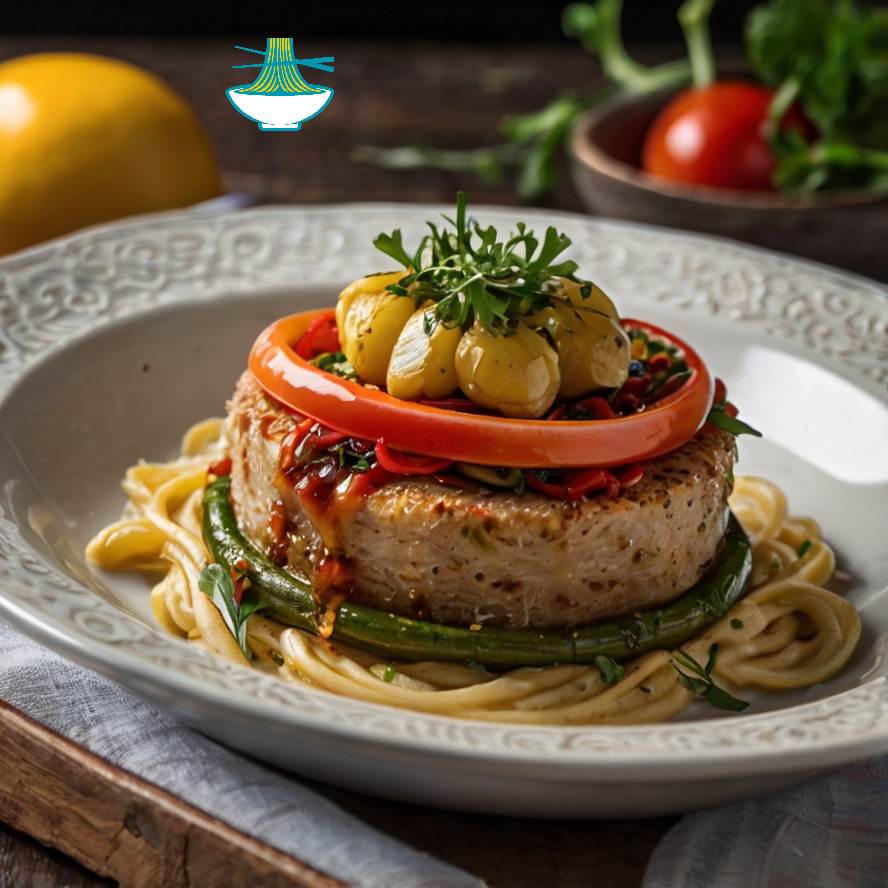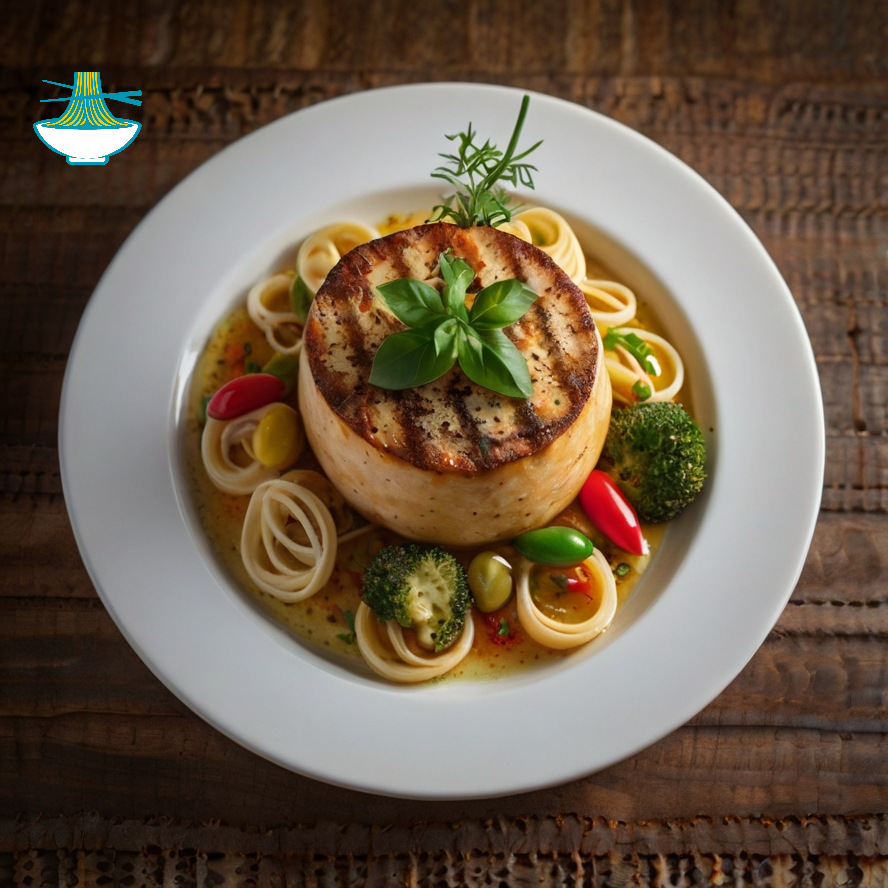Indulge in the flavors of the Middle East with Jordan Makloubeh, a tantalizing layered dish that brings together aromatic rice, tender meat—typically chicken or lamb—, and a medley of crispy fried vegetables. This culinary masterpiece is carefully assembled and cooked before being elegantly inverted onto a plate, revealing its intricate layers and inviting aroma. Each bite is a symphony of textures and tastes, offering a delightful journey through the rich and vibrant culinary heritage of Jordan.
Ingredients:
For the Meat:
- 500g chicken thighs or lamb, bone-in and cut into pieces
- 2 onions, thinly sliced
- 2 cloves garlic, minced
- 2 tablespoons olive oil
- 1 teaspoon ground cumin
- 1 teaspoon ground coriander
- 1 teaspoon paprika
- Salt and pepper to taste
For the Rice:
- 2 cups Basmati rice, rinsed and drained
- 3 cups chicken or lamb broth (or water)
- 1 teaspoon ground turmeric
- Salt to taste
For the Fried Vegetables:
- 2 eggplants, sliced into rounds
- 2 medium potatoes, peeled and sliced into rounds
- 2 medium tomatoes, sliced
- Vegetable oil for frying
For Assembly:
- Chopped parsley or toasted nuts for garnish
Instructions:
1- Marinate the Meat:
- In a bowl, combine the chicken or lamb with sliced onions, minced garlic, olive oil, ground cumin, ground coriander, paprika, salt, and pepper. Mix well to coat the meat evenly. Allow it to marinate for at least 30 minutes, or preferably overnight in the refrigerator.
2- Prepare the Rice:
- In a large pot, heat some olive oil over medium heat. Add the rinsed Basmati rice and toast it for a few minutes until fragrant.
- Pour in the chicken or lamb broth (or water) and add ground turmeric and salt. Bring to a boil, then reduce the heat to low, cover, and simmer for about 15-20 minutes or until the rice is cooked and the liquid is absorbed. Remove from heat and set aside.
3- Fry the Vegetables:
- Heat vegetable oil in a frying pan over medium-high heat.
- Fry the sliced eggplants, potatoes, and tomatoes separately until they are golden brown and cooked through. Remove them from the oil and drain on paper towels to remove excess oil.
4- Cook the Meat:
- In a separate pan, heat a bit of olive oil over medium heat. Add the marinated meat along with the onions and spices. Cook until the meat is browned on all sides and cooked through. Remove from heat and set aside.
5- Assemble the Makloubeh:
- In a large, deep pot or saucepan, arrange the cooked meat at the bottom of the pot in an even layer.
- Next, layer the fried vegetables on top of the meat, arranging them evenly.
- Finally, add the cooked rice on top of the vegetables, spreading it out evenly.
- Cover the pot with a lid and cook over low heat for about 30-40 minutes, allowing the flavors to meld together and the layers to set.
6- Invert and Serve:
- Once cooked, carefully invert the pot onto a large serving platter. The rice, meat, and vegetables should come out in a beautiful layered presentation.
- Garnish the Makloubeh with chopped parsley or toasted nuts before serving.
Enjoy your delicious Jordan Makloubeh, a true feast for the senses!
Nutritional Values :
Here’s the nutritional breakdown and benefits for each component of your dish:
Chicken Thighs or Lamb (500g):
Chicken Thighs:
- Calories: Approximately 1,000
- Fat: 70 grams
- Carbohydrates: 0 grams
- Protein: 60 grams
Benefits: High in lean protein, supports muscle growth and repair, and provides B vitamins and minerals.
Lamb:
- Calories: Approximately 1,400
- Fat: 100 grams
- Carbohydrates: 0 grams
- Protein: 80 grams
Benefits: Rich in protein, iron, zinc, and vitamin B12. Supports muscle growth, immune function, and overall health.
Onions (2 medium):
- Calories: Approximately 80
- Fat: 0 grams
- Carbohydrates: 19 grams
- Protein: 2 grams
Benefits: Contains antioxidants and compounds that support heart health and reduce inflammation. Adds flavor and nutrition to the dish.
Garlic (2 cloves):
- Calories: Approximately 10
- Fat: 0 grams
- Carbohydrates: 2 grams
- Protein: 0.5 grams
Benefits: Known for its antibacterial and antiviral properties, boosts the immune system, and supports cardiovascular health.
Olive Oil (2 tablespoons):
- Calories: Approximately 240
- Fat: 28 grams
- Carbohydrates: 0 grams
- Protein: 0 grams
Benefits: Provides healthy monounsaturated fats, antioxidants, and has anti-inflammatory properties. Supports heart health and enhances flavor.
Ground Cumin (1 teaspoon):
- Calories: Approximately 8
- Fat: 0.4 grams
- Carbohydrates: 1.5 grams
- Protein: 0.4 grams
Benefits: Contains antioxidants, aids digestion, reduces inflammation, and supports metabolic health.
Ground Coriander (1 teaspoon):
- Calories: Approximately 5
- Fat: 0.3 grams
- Carbohydrates: 1 gram
- Protein: 0.3 grams
Benefits: Contains antioxidants, aids digestion, and may help reduce blood sugar levels.
Paprika (1 teaspoon):
- Calories: Approximately 6
- Fat: 0.3 grams
- Carbohydrates: 1 gram
- Protein: 0.3 grams
Benefits: Adds color and flavor. Contains antioxidants and may have anti-inflammatory properties.
Salt (to taste):
- Calories: 0
- Fat: 0 grams
- Carbohydrates: 0 grams
- Protein: 0 grams
Benefits: Enhances flavor and helps maintain fluid balance in the body.
Black Pepper (to taste):
- Calories: Approximately 6 (for 1 teaspoon)
- Fat: 0.1 grams
- Carbohydrates: 1.5 grams
- Protein: 0.2 grams
Benefits: Adds flavor and has antioxidant and anti-inflammatory properties.
Rice:
Basmati Rice (2 cups):
- Calories: Approximately 400
- Fat: 0.8 grams
- Carbohydrates: 88 grams
- Protein: 8 grams
Benefits: Provides carbohydrates for energy, is aromatic, and has a low glycemic index compared to other rice varieties.
Chicken or Lamb Broth (3 cups):
Chicken Broth:
- Calories: Approximately 60
- Fat: 1 gram
- Carbohydrates: 1 gram
- Protein: 6 grams
Benefits: Enhances flavor, adds moisture, and provides a savory base for soups and dishes.
Lamb Broth:
- Calories: Approximately 90
- Fat: 2 grams
- Carbohydrates: 2 grams
- Protein: 8 grams
Benefits: Adds flavor and nutrients to the rice. The broth contains minerals and collagen from bones.
Ground Turmeric (1 teaspoon):
- Calories: Approximately 8
- Fat: 0.2 grams
- Carbohydrates: 1.5 grams
- Protein: 0.3 grams
Benefits: Contains curcumin, which has strong anti-inflammatory and antioxidant properties.
Fried Vegetables:
Eggplants (2 medium):
- Calories: Approximately 70
- Fat: 0.5 grams
- Carbohydrates: 17 grams
- Protein: 2 grams
Benefits: Low in calories and high in antioxidants. Supports heart health and adds a rich texture.
Potatoes (2 medium):
- Calories: Approximately 320
- Fat: 0.4 grams
- Carbohydrates: 72 grams
- Protein: 8 grams
Benefits: Provides carbohydrates and essential nutrients like potassium and vitamin C. Adds substance to the dish.
Tomatoes (2 medium):
- Calories: Approximately 44
- Fat: 0.4 grams
- Carbohydrates: 10 grams
- Protein: 2 grams
Benefits: Rich in vitamins A and C, and antioxidants like lycopene. Supports heart health and skin health.
Vegetable Oil (for frying):
- Calories: Approximately 120 per tablespoon
- Fat: 14 grams
- Carbohydrates: 0 grams
- Protein: 0 grams
Benefits: Used for frying, adding texture and flavor. Choose oils with a high smoke point and healthier fat composition.
For Assembly:
Chopped Parsley (for garnish):
- Calories: Approximately 10 (for 1/4 cup)
- Fat: 0 grams
- Carbohydrates: 2 grams
- Protein: 0.5 grams
Benefits: Adds freshness and provides vitamins A, C, and K, along with antioxidants.
Toasted Nuts (for garnish, if used)
- Calories: Approximately 200 (for 1/4 cup)
- Fat: 20 grams
- Carbohydrates: 6 grams
- Protein: 5 grams
Benefits: Provides healthy fats, protein, and various vitamins and minerals. Adds a crunchy texture.
Please note that these values are approximate and can vary depending on factors such as specific ingredients used and cooking methods. It's always a good idea to refer to the nutrition labels on the packaging of your ingredients for the most accurate information


Comments